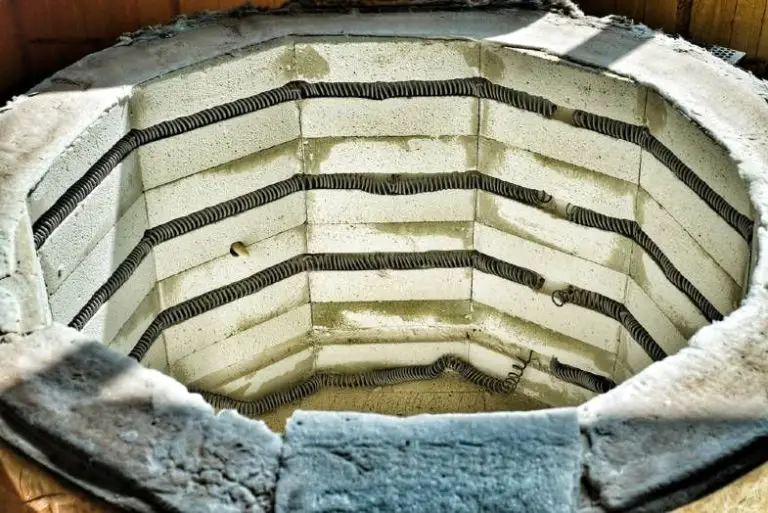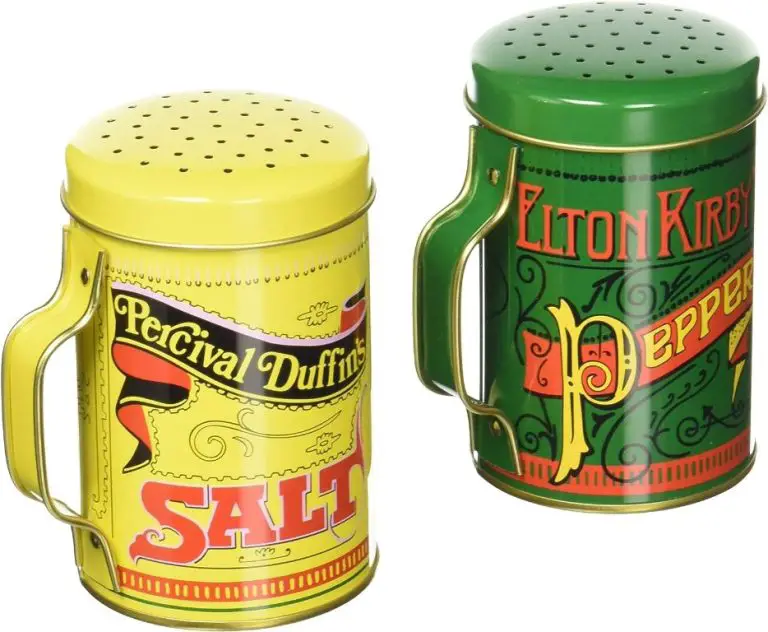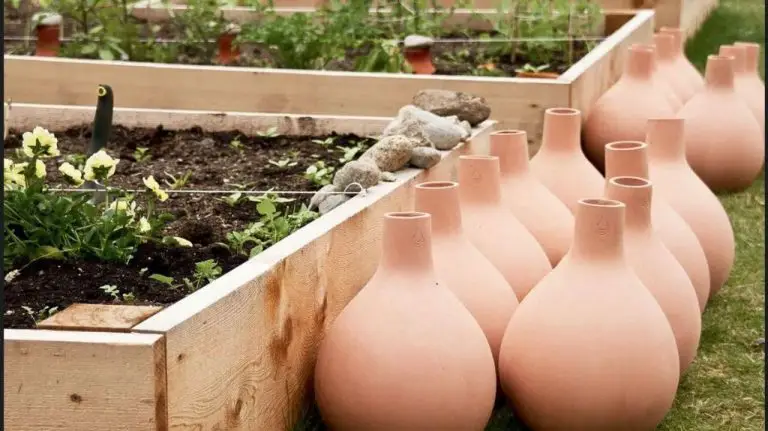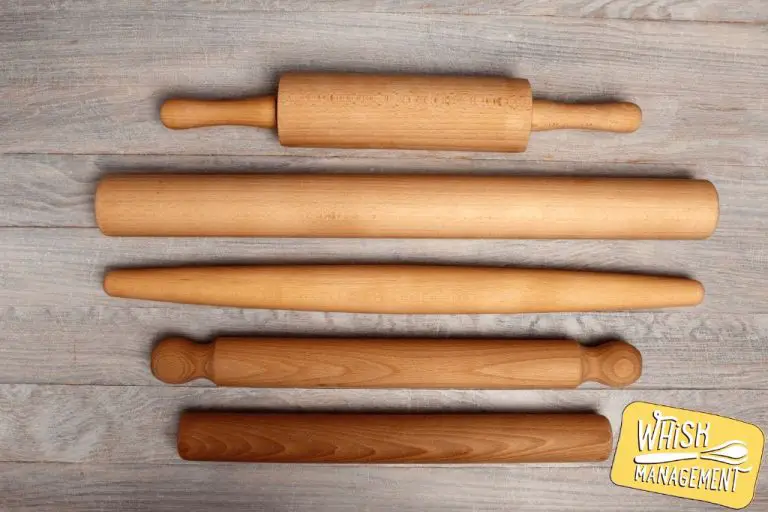Does Michaels Sell Pottery Wheels?
Michaels is a large American arts and crafts retail chain. Founded in Dallas, Texas in 1962, Michaels has grown to become the largest arts and crafts retailer in North America. The company currently operates over 1,200 stores in the U.S. and Canada under the Michaels and Aaron Brothers brands. Michaels sells a wide variety of arts, crafts, home decor, baking, and party supplies. Some of their major product categories include framing, beading, jewelry making, paints, scrapbooking, floral, kids crafts, bakeware, and more. With a focus on inspiring creativity, Michaels aims to help crafters bring their ideas to life. Their stores offer thousands of products as well as ideas, classes, and expert associates to educate and empower crafters of all skill levels.
Pottery Wheels
A pottery wheel is a device that rotates a disk for potters to shape clay vessels and other ceramic objects. The wheel head, or bat, spins on an axle that allows the potter to control the speed and direction while centering and forming the clay (https://www.stupots.co.uk/learn-pottery/using-a-pottery-wheel/). Pottery wheels enable consistency and symmetry in throwing pots, allowing skilled potters to quickly produce uniform pieces.
Pottery wheels have been used for thousands of years, originating in Mesopotamia and ancient Egypt. Today, most pottery produced in the world is thrown on a wheel. Wheels allow potters to shape clay into curved and rounded forms that would be very difficult to produce by hand building techniques like slab construction or coil building. The centrifugal force of the spinning clay allows it to be pulled up into standing walls as the potter uses their hands, tools, and water to form the interior and exterior profiles (https://www.botpots.co.nz/blog-post/types-of-pottery-wheels-for-beginners-and-a-step-by-step-guide-to-using-them-for-pottery/).
Uses of Pottery Wheels
Pottery wheels have been used for thousands of years to create pottery, bowls, vases, and other round ceramic items. The spinning motion of the wheel allows potters to center and shape clay into symmetrical forms with ease and precision.
On a pottery wheel, a lump of clay can be placed in the center and spun at various speeds as the potter molds the form using their hands. The momentum from the spinning helps shape the clay evenly and smoothly. As the potter applies pressure and guides the clay upwards with their fingers, a vessel takes shape.
Pottery wheels enable the efficient production of uniform ceramic pieces. From ancient amphorae to modern mugs, bowls and vases, potters rely on the pottery wheel to craft round objects with thin walls and even shapes. The speed control offered by the wheel head allows for delicate manipulation of the spinning clay.
In addition to creating functional pottery, throwing clay on a wheel is an art form dating back thousands of years across many cultures. Modern potters craft artworks, sculptures and decorative objects using the pottery wheel’s capabilities.
While free hand building can be used to create some ceramic forms, the pottery wheel remains an essential tool for artists and artisans producing round pottery wares ranging from plates and teacups to large urns and jars.
Sources:
https://preparednessadvice.com/diy-pottery-wheel-designs/
Types of Pottery Wheels
There are two main types of pottery wheels according to Choosing A Pottery Wheel – Step-by-Step Buyer’s Guide and The Best Pottery Wheels: A Buyer’s Guide: electric and kick wheels.
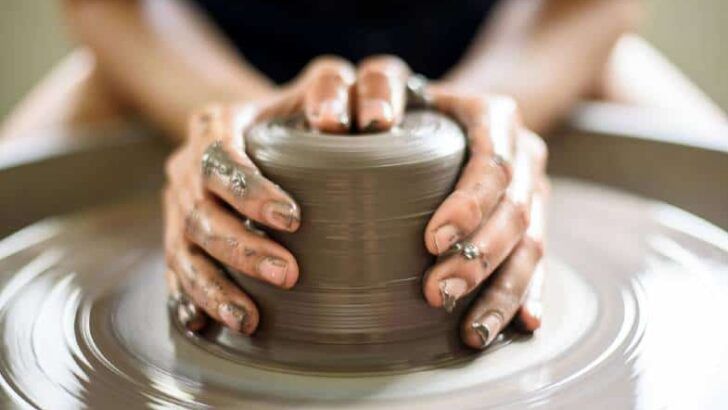
Electric Pottery Wheels
Electric pottery wheels are powered by electricity and have a motor that rotates the wheel head. They allow potters to easily control the speed and direction of the spinning wheel with a pedal or switch. Electric wheels are convenient, require less physical effort, and are ideal for throwing larger pieces of clay. Brands like Brent and Shimpo make quality electric pottery wheels.
Kick Wheels
Kick wheels, also called treadle wheels, require the potter to power the spinning wheel with their foot pedal. The wheel rotates based on the speed and pressure applied by the potter’s foot. Kick wheels provide more direct control and feedback. They are portable and don’t require electricity. Kick wheels are a good budget-friendly option for beginners learning how to throw pottery.
Pottery Wheel Features
Some key features to consider when selecting a pottery wheel include:
Wheel Head Size – The wheel head, or wheel plate, is the round disc that spins. Standard sizes range from 12-18 inches in diameter. Larger wheels provide more surface area for centering larger pieces. Smaller wheels take up less space.
Speed Control – Variable speed control allows potters to start slowly and increase the speed as desired. Some wheels offer a foot pedal for easy speed adjustments during throwing. RPMs can range from 0-300+. Lower speeds are good for beginners.
Splash Pans – Splash pans attach below the wheel head to catch water and clay scraps. Deeper pans allow less mess and stop debris from clogging the wheel mechanism. Removable pans are easy to empty and clean.
Motor Type – Direct drive motors provide more torque and control. Belt driven motors can wear out more quickly but may be less expensive. Brushless DC motors are quiet, energy efficient, and durable.
Sturdiness/Vibration – Heavier weighted wheels made of materials like cast iron or metal alloys reduce vibration for cleaner throws. Some models have leveling feet for stability.
Drive Type – Kick wheels require leg power to spin the wheel head. Electric pottery wheels use an electric motor and do not require kicking. Most potters prefer electric for convenience.
Other features can include tilting wheel heads, digital speed displays, forward/reverse toggles, and built-in water pumps for spraying clay while throwing.
Pottery Wheel Brands
Some of the top pottery wheel brands include Brent, Shimpo, Skutt, Speedball, and Laguna (1). These companies are well-known for making high-quality wheels for potters of all skill levels.
Brent pottery wheels are a popular choice for beginners and professionals alike. They are known for being very quiet and providing smooth, steady power (1). Many potters appreciate Brent wheels for their durability and long lifespan.
Shimpo is another leading brand that makes sturdy, Japanese-engineered wheels. Their wheels offer strong torque and variable speed control (2). Shimpo wheels are praised for their whisper-quiet operation.
Skutt is a family-owned company based in Oregon that manufactures American-made potter’s wheels. They are known for innovative features like wheel-throwing cameras and ergonomic designs (2). Skutt aims to make high-performing yet affordable wheels.
Other notable brands are Speedball, known for lightweight and inexpensive wheels, and Laguna, which offers a range of quality wheels at moderate prices. When shopping for a pottery wheel, it’s wise to stick to reputable brands that craftsmen have come to rely on.
Pottery Wheel Prices
Pottery wheels can range greatly in price depending on the features, size, and build quality. Here is an overview of pottery wheel price ranges:
Budget: Pottery wheels under $200 are considered budget models. They typically have smaller wheel heads around 10-12 inches, lighter weight constructed frames, and more basic features. Speed control may be limited and they are best suited for beginners or light use. Examples include the Amaco Brent pottery wheel and Speedball Artista pottery wheel.
Mid-Range: The $200 to $800 price range offers mid-range pottery wheel models. Wheel heads are generally 12 to 14 inches, with sturdier metal frames, higher weight capacities, variable speed controls, and useful accessories. Brands like Shimpo, Skutt, and Brent offer quality mid-range models great for intermediates and hobbyists.
Professional: For $800 to $2,500+ you’ll find professional-grade pottery wheels with heavy-duty construction, large wheel heads up to 18 inches, high horsepower motors, precision speed controls, and robust features for intensive use. Top brands like Brent, Shimpo, and Soldner provide pro-level wheels for full-time ceramic artists and students.
Michaels Overview
Michaels is one of the largest arts and crafts retail chains in North America. With over 1,200 stores across the United States and Canada, Michaels offers a wide selection of arts, crafts, framing, floral, wall decor, bakeware, party supplies and more. According to brads deals, Michaels sells a huge variety of products including art supplies, crafts & hobbies, floral, decor, baking, wedding, frames, fabric, and more.
Some of the main product categories at Michaels include:
- Art Supplies – paint, brushes, canvases, drawing supplies
- Crafts – yarn, sewing, jewelry making, wood crafts, origami
- Scrapbooking – albums, stickers, die cuts, stamps
- Floral – faux flowers, vases, wreaths, garlands
- Home Decor – wall art, mirrors, candles, clocks, furniture
- Seasonal – Christmas, Halloween, Easter decor
- Baking/Culinary – cake decorating, bakeware, kitchen tools
- Wedding – invitations, favors, decorations
- Kids Crafts – slime, magic kits, science kits
- Framing – custom framing services
With such a broad selection, Michaels aims to be a one-stop shop for creative enthusiasts and DIYers. They offer quality supplies for visual arts, floral design, scrapbooking, sewing, baking and more.
Michaels Arts & Crafts Selection
Michaels is one of the largest arts and crafts retail chains in North America. With over 1,200 stores across the United States and Canada, Michaels offers a wide selection of arts, crafts, framing, floral, wall décor, bakeware, and seasonal merchandise. Some of the main categories that Michaels sells include:
Paint
Michaels has a large selection of acrylic, oil, and watercolor paints from top brands like Liquitex, Winsor & Newton, DecoArt, and Craft Smart. They offer paint in tubes, jars, and bottles in different quantities for artists of all levels. Michaels also sells a variety of brushes, palettes, canvases, and other painting tools and accessories.
Sewing & Needlecrafts
For sewing and needlecraft enthusiasts, Michaels stocks sewing machines, fabric, yarn, embroidery floss, knitting needles, crochet hooks, quilting tools, sewing patterns, and cross-stitch kits. Well-known brands carried include Singer, Bernina, Coats & Clark, Moda Fabrics, and DMC.
Jewelry Making
Michaels has all the essential jewelry making supplies including beads, charms, wire, stringing materials, jewelry tools, and findings. They offer gemstones, glass beads, metal beads, and more from brands like Bead Landing, Artistic Wire, and Jewelry Shoppe. Michaels also sells pre-made jewelry components like chains, clasps, and earring hooks.
In addition to these categories, Michaels provides a wide selection of crafts supplies and materials for floral arranging, scrapbooking, framing, baking decorating, kids’ crafts, and more. Their comprehensive arts and crafts selection caters to hobbyists and DIY crafters of all skill levels and interests.
Does Michaels Sell Pottery Wheels?
Michaels is one of the largest arts and crafts retailers in North America, with over 1,200 stores across the United States and Canada. While Michaels sells a wide selection of art supplies for various mediums like painting, scrapbooking, and jewelry making, some customers have wondered whether Michaels also sells pottery wheels and equipment for ceramics.
After reviewing their online selection, it appears that Michaels does sell a limited variety of pottery wheels and ceramics equipment. Some of the major pottery wheel brands carried by Michaels include Brent, Spellbound, and Amaco Brent. They offer pottery wheel packages for beginners, as well as individual replacement pottery wheels and wheel heads. Some examples of pottery wheels sold at Michaels include:
- Brent CXC Pottery Wheel – $399.99
- Spellbound Pottery Wheel Starter Kit – $189.99
- Amaco Brent LXC Replacement Pottery Wheel Head – $109.99
In addition to pottery wheels, Michaels sells other ceramics studio equipment like kilns, clay tools, workstations, and ceramics accessories. However, their selection of pottery wheels and ceramics supplies appears to be quite limited compared to specialty art stores. Michaels may offer enough basic equipment for ceramics beginners, but advanced pottery artists may need to look elsewhere for more professional-grade wheels and tools. Overall, Michaels does sell pottery wheels and ceramics equipment, but their product range is targeted more for hobbyists than professional ceramic artists.

